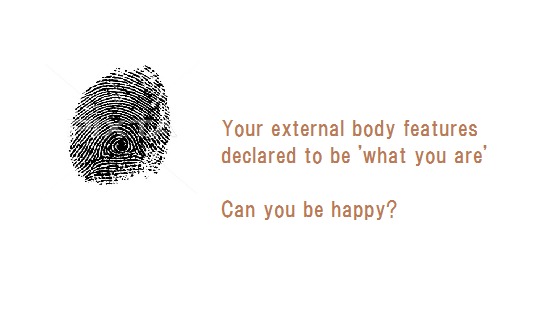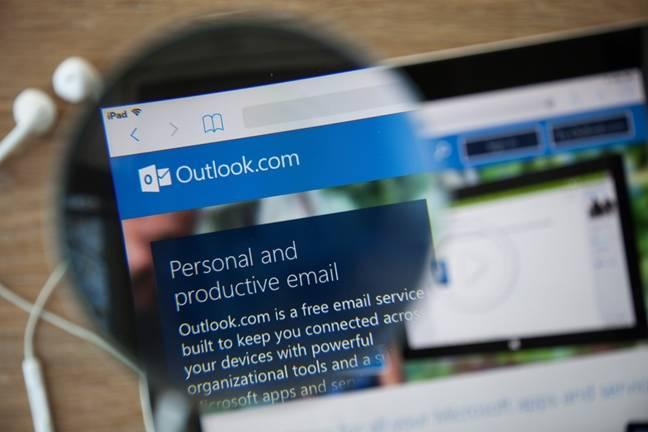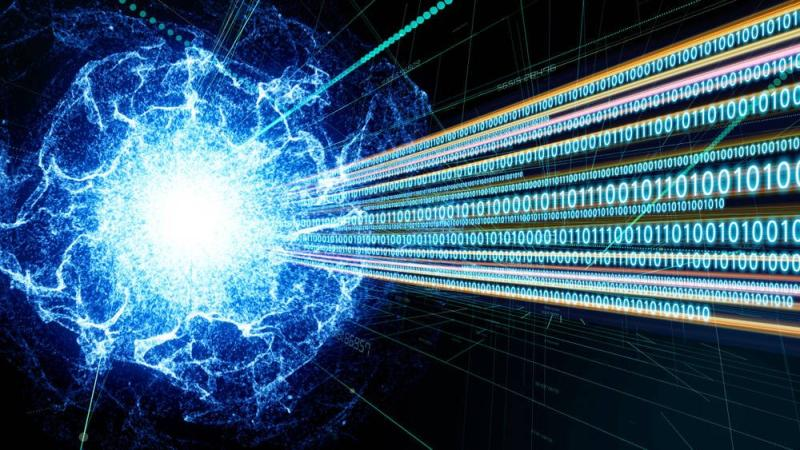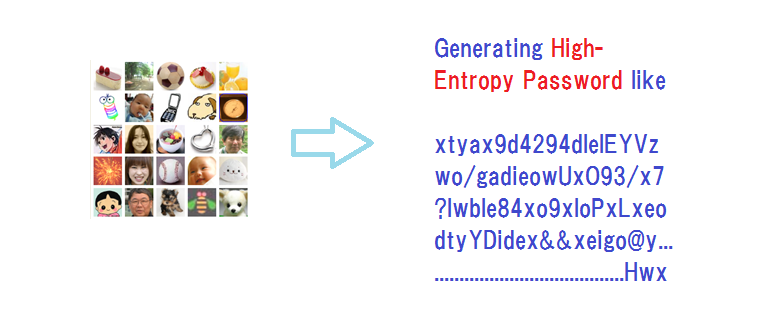External Body Features Viewed as ‘What We Are’

Body features are no more than body features
Can you be happy to see your external body features declared to be ‘what you are’?
Quite a few security experts have long asserted that there are three components for identity authentication – ‘What We Remember’ (Secret Credential), ‘What We Have’ (Tokens and Cards) and ‘What We Are (Body Features).
Feeding a correct secret credential is under our control. So is presenting a correct token or card to some extent. But our body features are just beyond our control. Wouldn’t it be more appropriate to call it ‘What Our Body Features Are’?
Furthermore, whether the secret credential is correct or not is ‘Yes or No’, in other words, it is deterministic. So are the token and card. But measurements of our body features give us the answer as X% probable and Y% improbable. It has to be inevitably probabilistic due to the inherent nature of body features of living animals that we can by no means put under our control.
‘What we remember’ and ‘What we have’, which are both deterministic, can be used together in a security-enhancing ‘two-layer’ deployment, whereas probabilistic ‘what our body features are’ can actually be used with another factor only in a security-lowering ‘two-entrance’ deployment.
As such we have now come to observe that we actually have two factors of ‘what we remember’ and ‘what we have’ as valid authenticators for identity assurance, with ‘what our body features are’ to be counted in cyberspace as an optional tool to increase convenience at the sacrifice of security.
It might sound a bit outrageous to the old school who have long taken it for granted that ‘what we are’ is made of our external body features. But we are confident that the public will agree with us at the end of the day.
What makes ‘What We Are’
Cognitive science supports the observation that our sense of self is made of our memory, especially a part of our autobiographic memory named episodic memory. This observation of our identity is also supported by a number of philosophers. We can rely on these observations for stating that what makes ‘what we are’ is ‘what we remember’.
We may be a minority in the domain of cyber security and identity management at present, but it does not affect what is correct and what is wrong.
Click the link for more https://www.linkedin.com/pulse/external-body-features-viewed-what-we-hitoshi-kokumai
Hitoshi Kokumaiの記事
ブログを見る
Today's topic is “Microsoft Exchange Autodiscover protocol found leaking hundreds of thousands of cr ...

We today take up this report “NSA: We 'don't know when or even if' a quantum computer will ever be a ...

We’ve come up with a slide presentation for “Bring a healthy second life to your legacy password sys ...
関連プロフェッショナル
この職種に興味がある方はこちら
-

臨床検査技師[正規職員(常勤)]
次の場所にあります: Whatjobs JP C2 - 5日前
東京大学医学部附属病院 Tokyo, 日本**職名** · - 臨床検査技師(正規職員(常勤)) · **人数** · - 1名 · **契約期間** · - 2024年3月1日以降~期間の定めなし(勤務開始日については応相談) · **試用期間** · - 採用された日から6か月間 · **就業場所** · - 東京大学医学部附属病院 輸血部 · - (東京都文京区本郷7-3-1) · **所属** · - 東京大学医学部附属病院 検査部 · **業務内容** · - 臨床検査業務全般(輸血検査、採血、検体検査 等) · **就業日・** · **就業時間** · - 4週間を平均して1週38 ...
-

保育士
次の場所にあります: beBee S2 JP - 2日前
ナーサリー千住大橋 足立区, 日本 TEMPORARY【ナーサリー千住大橋の求人ポイント】 · ◆京成本線千住大橋駅より徒歩2分 · ◆月給235,000円 ~ · ◆園児定員:60名 · ◆独身寮(借上げ1ルームマンション) · ◆認可保育園の保育士 · ----- · 勤務地 · ----- · 東京都足立区千住橋戸町1-13ポンテポルタ千住3階 · ----- · 最寄り駅 · ----- · 京成本線千住大橋駅 徒歩2分 · ----- · 園名 · ----- · ナーサリー千住大橋 · ----- · 施設形態 · ----- · 認可保育園 · ----- · 園児定員 · ----- · 6 ...
-
介護福祉士/正社員/年収413万円以上【入社祝金15万円進呈】
次の場所にあります: Talent JP C2 - 1日前
株式会社アンビス Numazu, 日本 正社員採用情報 勤務時間 1)早番:7:00~16:00 · 2)日勤:8:30~17:30 · 3)遅番:11:00~20:00 · 4)夜勤:16:30~翌9:30 · ※休憩60分 · ※夜勤明けの次の日は基本お休み · ※月5~7時間程度 想定給与 給与:月給28.7万円~月給29.8万円、年収413万円~年収428万円 · ※夜勤4回/月手当込 · 夜勤手当8000円/回、拠点により回数は異なる 休日・休暇 月9日(10日の月もあり) · 年間休日:115日(夏季冬季休暇含む) · 有給休暇:4月or10月付与(最短入社2日目で付与されます) 必須ス ...

コメント
Hitoshi Kokumai
3年前 #2
I do not think which of password and biometrics is better or worse. The two belong to different categories. Our body features may identify us at a certain probability, but the same body features are unable to get us authenticated on its own by deciding'Yes or No' because of its probabilistic nature. On the other hand, although passwords are not able to get us identified (it's the role of User ID/Name), the same passwords are able to get us authenticated effectively by deciding 'Yes or NO'.
Debesh Choudhury
3年前 #1